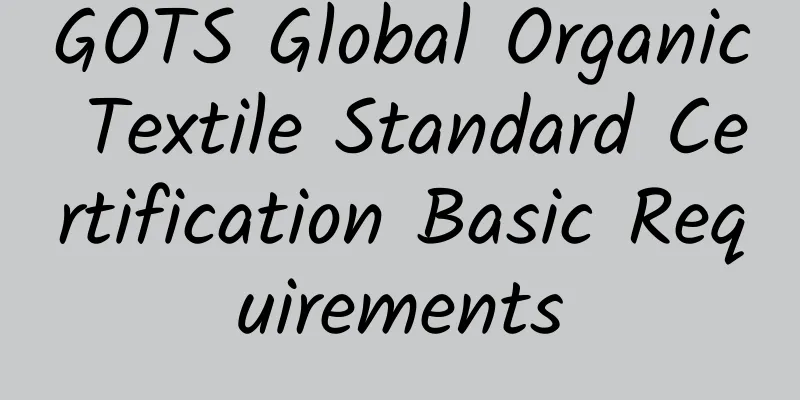GOTS Global Organic Textile Standard Certification Basic Requirements

|
Shanghai Chaowang has decades of experience in the factory inspection industry and has helped tens of thousands of factories pass the factory inspection. Since many factories do not know the basic requirements of GOTS Global Organic Textile Standard certification , that is, what conditions should be met if they want to pass GOTS Global Organic Textile Standard certification, so we provide the following information. GOTS Global Organic Textile Standard Certification Basic Requirements: 1. The processing must meet the following requirements: 1. All chemical inputs must be evaluated before use (e.g. fuels, additives and process chemicals) and must meet basic requirements for biodegradability and biodegradability. 2. Ensure the separation of organic textiles and conventional textiles throughout the entire processing process. 3. The use of toxic heavy metals, formaldehyde, genetically modified substances and other inputs is prohibited. 4. The welfare of all production personnel should meet the requirements of the social minimum standards (according to the requirements of the International Labor Organization). 5. All produced wastewater must be treated in a dedicated wastewater treatment unit. 6. Strictly limit the use of packaging materials. For example, polyvinyl chloride, nickel or chromium are not allowed, and plastics cannot be used for decals or inlays. 7. Only paraffin wax and paraffin oil obtained from natural raw materials are allowed to be added during the spinning process. 8. Non-woven fabrics: mechanical compaction, weaving, winding (hydraulic winding). 9. In sizing, as well as in the weaving/knitting process, starch, starch derivatives, other natural substances and carboxymethyl cellulose (natural substances combined with less than 25% polyol or polyaluminium chloride) are allowed. 2. Establish a complete quality control system: Residue detection 1. Based on the risk assessment of contaminants, operators need to conduct residue testing. 2. The value of residual residue specified in the standard. 3. Samples are taken by auditors/reviewers and tested by ISO-accredited laboratories. On-site audit: 1. Certification of the entire production chain 2. Operators must conduct on-site inspections once a year from the time they receive the goods until they are made into finished garments (including exporters and importers). 3. The certification body needs to follow the requirements of ISO65, including the scope of textile certification and accreditation, and be approved by IWG. Through the introduction of the basic requirements of GOTS Global Organic Textile Standard certification in the above article, everyone should have a certain understanding of it. If you have any questions or want to consult more information, you can communicate with our seat experts online or by phone. We will not only provide you with comprehensive information, but also provide you with first-class services, and are committed to helping factories pass the factory inspection smoothly! |
<<: GOTS Global Organic Textile Certification Standard
>>: GOTS Global Organic Textile Certification Audit Key Points
Recommend
What is Merge? What are the benefits of using Merge?
One quick and easy Amazon trick every day. Today ...
Walmart's latest standard high-risk items in 2013: deductions and benefits
1. Collecting fees for PPE, factory uniforms, etc...
What is GrowingIO? How to convert through GrowingIO?
What is GrowingIO? GrowingIO is a new generation ...
POLO factory inspection standards
POLO RALPH LAUREN operates around the world with e...
What is Gougou.com? What services does Gougou.com provide?
Gougou.com is a website that provides a platform ...
Is it better to have a Mango store manager or a store secretary?
Mango Store Manager Cost: Forever free software, ...
Influencer.fm—One-stop overseas influencer marketing
What is Influencer.fm? Influencer.fm is a one-sto...
eBay supports overseas warehouses, sellers receive "special protection" after use
Recently, the cross-border e-commerce platform eB...
How can eBay sellers use negative feedback to their advantage?
Remember, the purpose of eBay feedback is to help...
China's manufacturing industry needs to overcome three challenges in 2011
As the Spring Festival approaches, manufacturing ...
What is Saihe Technology? What are the functions of Saihe Technology?
Shenzhen IrobotBox Technology Co., Ltd. (IrobotBo...
GRS (Global Recycle Standard) Global Recycling Standard
The Global Recycling Standard GRS certification is...
Mattel factory inspection, Mattel factory inspection process
Mattel is the world's largest toy manufacturer...
What is Ezbuy? Ezbuy's advantages and entry conditions
Ezbuy was co-founded by He Jian and a group of am...
iDEAL - Online Payments in the Netherlands
What is iDEAL? iDEAL is the largest online paymen...









